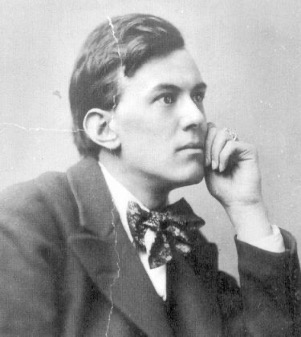Aleister Crowley made three trips to Egypt between 1902 and 1904, and all three trips are fictionalized in the Dead Egyptians series. I would like to walk the reader through the facts which formed the basis of my story.
By the time Aleister Crowley experienced Egypt, he was already famous within his own circles – through his Cambridge connections, through his occult Golden Dawn connections (famously feuding with William Butler Yeats), and through his money, which was, at this time in his life, seemingly without end. He couldn’t spend his fortune fast enough, although he did try – travelling to the Americas, the Far East, and now, to Egypt.
He was twenty-seven years old when he arrived at Shepheard’s Hotel in the fall of 1902.

Aleister Crowley in his salad days (youth)
“I arrived in Cairo on the fourteenth and was transported to the seventh heaven. I lived at Shepheard’s Hotel until Guy Fawkes’s Day, wallowing in the flesh pots. I would not even go out to see the Pyramids. I could not have forty centuries looking down upon me. Confound their impudence!”
(from The Confessions of Aleister Crowley).
While in Cairo, he studied ethnology (anthropology), and concluded that people from the East (in his day, every nation from Japan to Morocco) – have a “much more intense mental life.” He even concludes that the people of Asia and Africa are aware of the higher states of mind, while in the West, people are too consumed with ‘the shallows’, i.e. business and family life, leaving no time for arcane matters.

The entrance to the Moorish Hall of Shepheard’s Hotel
Crowley returned to Egypt on his honeymoon – twice, in fact. Once on the way east, and once on the way west. There is a very famous story about the first trip, which took place in 1903. After a couple stops in France and Italy, Rose and Aleister Crowley arrived in Cairo. He described it as their first ‘breathing place’ – and, like a male bird showing off his plumage, decided to arrange to spend the night in the Great Pyramid, where he would attempt an act of magick to impress his new wife.
“By the light of a single candle…I began to read the invocation…Looking about me, I saw that the King’s Chamber was glowing with a soft light which I immediately understood as the astral light…If I had to affix a conventional label, I should probably say pale lilac. But the quality of the light is much more striking than the colour. Here the word phosphorescence occurs to the mind.”
Crowley successfully managing an illumination spell in the Great Pyramid is the stuff of legend – I myself heard the story when I was still a child, and I have no doubt that the seed planted that day grew and grew until a story about dead Egyptians could, more or less, not exist without Aleister Crowley making an appearance. But I digress.
Rose and Aleister returned to Cairo in 1904 after another stint in the Far East. Did I mention he was richer than God? What happened next makes the illumination story a footnote. After a relatively innocuous period of misbehavior, in which Aleister pretended he was a Persian prince, hired himself a sheikh to learn Islamic mysticism (Sufism, taught to him by a member of the Sidi Aissawa order), it gets really good.
About the events which follow, Aleister has this to say:
“My entire previous life was but a preparation for this event, and my entire subsequent life has been not merely determined by it, but wrapped in it.”
Rose and Aleister rented an apartment. On March 16th, Aleister attempted to invoke the sylphs, which resulted in Rose entering a trance state, saying, “They are waiting for you.” In subsequent days, Rose entered the trance state again, and none less than the Ancient Egyptian gods make an appearance. Through Rose, specific instructions are given, and Aleister is able to invoke…something or someone. For three consecutive days, between noon and one, Aleister hears someone or something, and writes down every word. The text eventually becomes The Book of the Law, and births the religion of Thelema.
Still with me? In my opinion, The Book of the Law is disjointed, even for a religious text. At times, it is gentle, while at other times, it is proudly violent. In the context of Dead Egyptians, this is explained away by having two different narrators (Nut initially, later Aiwass). Aleister himself did not know what to make of the experience, and for some years, merely compartmentalized the experience. Eventually, though, he begins to draw conclusions.
“The Book of the Law presumes the existence of a body of initiates pledged to watch over the welfare of mankind and to communicate its own wisdom little by little in the measure of man’s capacity to receive it.”
The text declares the ‘Equinox of the Gods’ i.e. the dawn of a new age, in which the age of Osiris will be replaced by the age of Horus. He speaks of the triad of Isis, Osiris, and Horus (Mother, Father, and Child) in the sense that the new age, as the ‘child’ of the old age, will sweep away previous morality and start afresh with a new set of morals. It’s an interesting supposition. Did Crowley mean that the gods are evolving along with humans, or that the gods only disclose knowledge (and codes of behavior) as humans are ready to receive them? I support the latter explanation, personally.
Thelema’s code of behavior declares that ‘every man and woman is a star’, a statement explained in great detail in Confessions.
“Every man and woman has definite attributes whose tendency, considered in due relation to environment, indicate a proper course of action in each case. To pursue this course of action is to do one’s true will…The physical parallel still holds. In a galaxy each star has its own magnitude, characteristics, and direction, and the celestial harmony is best maintained by its attending to its own business…Even a single star, by refusing to do its own will, by restricting itself in any way, would immediately produce disorder.”
Do what thou wilt shall be the whole of the Law. (Follow your own star).
Like Crowley, I struggled to untangle the Book of the Law on initial readings. I hope this helps you, the reader, understand a little more about it and how it came to be. And why, whether or not we believe in the occult or in Crowley or in Thelema, they make a fascinating study.
